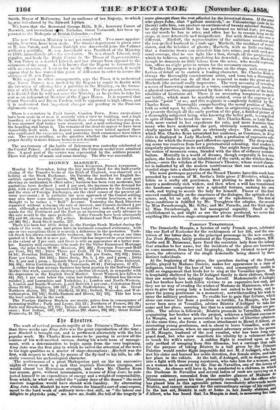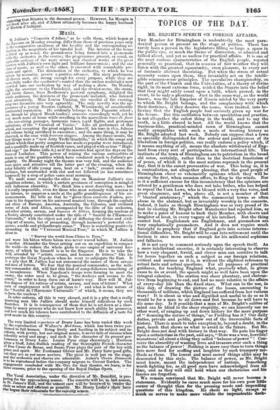SOF M4ratrps.
The work of revival proceeds rapidly at the Princess's Theatre. Less than three weeks ago King john was'the.gretit reproduction of.the time ; now Macbeth is brought out, aid is performed alternately with the less popular work. Mr. Charles Kean seems to be passing in review all the sources of his well-merited success, during his.whole term of manage- ment, with a determination to begin again from the very beginning. King Joky was the first play in which he called the attention of the town to his high qualities as a master of atage-deeorations ; Macbeth was the first, with respect to which, by means of the fly-leaf to his bills, he offi- cially assumed his archaeological character. The performance of a great Shaksperian part on the six successive nights of every week is a task that requires Herculean energies, and would almost tax Herculean strength, and when Mr. Charles Kean last season, gave, without intermiasion, a Course of King Lear, he sub- jected himself to an expenditure of energy and a weight-of responsibility, from which, in what are called the " palmy days of the drama" the most resolute tragedian would have shrunk with timidity. By alternating 'King John with _Macbeth he now obtains for himselfa sort of semi-repose, opal to the hard work of ordinary men—but still, as "the labour one 4olighte in physicks pain," we have no ,doubt tho toil of the tragedy is
snore pleasant than the rest afforded by the historical drama. If the actor
' who plays John, that "gallant monarch," as Faleonbridge (sole in his theory) calls him, can produce an excitement of twenty minutes' duration, he may flatter himself that he has performed no trivial feat; yet num, are the Words he hos to utter, and often has he to remain long on the stage, at Once detestable and insignificant. But with Macbeth the ease l different. Macbeth, the representative of the ambitious murderer and the hen-pecked husband in a 'rude age ; Macbeth, the confidant of weird sisters, and the beholder of ghosts ; Macbeth, with so little resolution: that a feminine frown can stimulate him into crime, and with such per. sonal courage, that he can fight like a lion, though all the prophecies in which ho.believes, unite in predicting his downfall ; this same Macbeth though he demands no little labour from the actor, who would represent him, offers no slight prize in return for the necessary exertion. Whether his purpose is to place a drama on the stage, with every pe,_ fection of detail or to sustain a leading character, Mr. Charles Kean is always the thoroughly conscientious artist, and none but a thoroughly conscientious artist can do all that is required to make the great set Macbeth (the Second) really impressive. The very necessity of revealing a series of harrowing emotions in a voice, constantly suppressed, involves a physical exertion, 'unappreciated by those who are ignorant of the tech- nicalities of histrionic art. There is an unceasing temptation to speak out boldly, which must be manfully resisted, even at the expense of a possible "point" or so ; and this requisite is completely fulfilled by Mr. Charles Kean. Thoroughly comprehending the moral position of Mae. both as acted upon by others, rather than as originating action himself ho presents through all the early portion of the play, a finished picture of a thoroughly subjected being, who knowing the better path, is compelled in spite of himself to tread the worse. Mrs. Charles Kean, as Lady Mac- beth, more varied in her expedients for rule, and more feminine than many who have undertaken the part, obviously commands, and, he clearly against his will, quite as obviously obeys. The strength with which Mrs. Charles Kean astonished her audience, as Constance, in King John is displayed in Lady Macbeth, with a profusion of expressive sub- tlities, for which the former part offered no opportunity. The sleep-walk- ing scene too receives from her a preternatural colouring, that renders it singularly picturesque in its awfulness. One might fancy something like the notion of mesmeric coma, blended with the idea of ordinary sonnam- buns= Mentally in a world of dreams, though corporally in her own palace, she looks as little an inhabitant of the earth, as the witches there- selves,—even the witches of the Princess's Theatre, whose weird charac- ter is indicated by all the modern contrivances that can convert a sub- stantial stage into a shadowy dream-land. The more grotesque gayeties of the Strand Theatre have this week been preceded by a version of M. Scribe's little piece .L'HiritRre, which ex- hibits us a crafty old gentlemen, first plotting to make his nephew marry a moderately rich widow, and then when a will has transformed the handsome competency into a splendid fortune, undoing his own work, and trying to secure the lady for himself. Pieces of this kind succeed conditionally on the smartness of the dialogue, the aptitude of the actors, and, let us add, the elegance of the upholstery. The first of these conditions is fulfilled by Mr. Troughton the adapter, the second by Miss Swanborough, Mr. Selby, and Mr. Parselle, and the third again by Miss Swanborough, in her managerial capacity. Small as the establishment is, and slight as are the pieces produced, we never find anything like careless stage-arrangement at the Strand Theatre.
PARISIAN THEATRICALS.
Tho Demoiselle Maupin, a heroine of early French opera, celebrated like our Earl of Rochester for the recklessness of her life, and the con- trition of her latter days, is the principal personage in the new comedy, Lee Trois ifaupins, lately produced at the Gymnase. The authors, KM. Scribe and H. Boisseaux, have freed the eccentric lady from the infamy that attaches to her name, but the incidents of the piece are borrowed, in some measure, from her real biography, though twisted to new pur- poses, the adventures of the single demoiselle being shared by three distinct individuals.
At the beginning of the piece, the quondam darling of the French public, played by Madame Desiree, makes her appearance in a state of indigence, ruined by the loss of her voice, and consequently unable to fulfil an engagement that binds her to sing at the Versailles opera. She is hospitably sheltered by the D'Aubigne family in their château, though they are scarcely less unhappy than herself. Mademoiselle d'Aubigne and her brother have both fallen victims to an expensive law-suit, and they see no way of evading the wishes of Madame de Maintenon, who de- sires to give the young lady a husband not suited to her taste, and to place the young gentleman in a monastery, notwithstanding his wish to enter the military profession. To enable her to gain that fortune, which alone can rescue her from a position so terrible, La Maupin, who has never been seen at Versailles, advises Beatrix d'Aubigne to take her name and her place, assuring her that to a cantatrice all things are Pos- Bible. The advice is followed; Beatrix proceeds to Versailles, without acquainting her brother with the project, achieves a brilliant success as La Maupin, and is soon persecuted by a number of libertine admirers. At the same time, she forms a serious attachment to Henri d'Albe.et, an interesting young gentleman, and is about to leave Versailles, profits of her success, when an unexpected adversary arises in the person of M. Maupin, husband of the real vocalist, who has been long sup- posed dead, but who now manifests his vitality by a vehement desire to touch his wife's salary. A sudden flight is resolved upon as the only method of escaping from this dilemma, but a carriage that calls for the purpose of taking Beatrix to a ball given by the Princess Palatine would render flight impossible did not M. d'Aubigne, who has met his sister and learned her noble devotion, don female attire, and take her place in the vehicle. At the ball, d'Aubigne, still in disguise, gets into a fight with three young roysterers, who take him for a woman, and as a woman he is assisted by the Due de Navailles, one of the lovers of Beatrix. As chance will have it, he is conducted to a château, in which the Duchesse de Navailles and several ladies of rank are carrying 00 a joyous existence, concealed from the sombre glances of Madame de Maintenon, and passes his time pleasantly enough ; but the officer who has placed him in this agreeable prison immediately afterwards meets Beatrix, and cannot account for the extraordinary escape of his captive. In the last act, Beatrix is safe at home in her family chateau, and d'Albret, who has heard that La Maupin is dead, is mourning her loss, opposing that Beatrix is the deceased person. ' However, La Maupin is not dead after all, and d'Albrot ultimately becomes the happy husband of Beatrii d'Allbigne•



































 Previous page
Previous page